Power Struggle on Broadway
Escapist vs. Socially Conscious Shows in the 2016–17 Season
A reader who believed I was insufficiently enthusiastic in my review of the fourth Broadway revival of Hello, Dolly and of its star Bette Midler, made a comment that got me thinking:
“This show is so needed now, more than ever,” she tweeted.
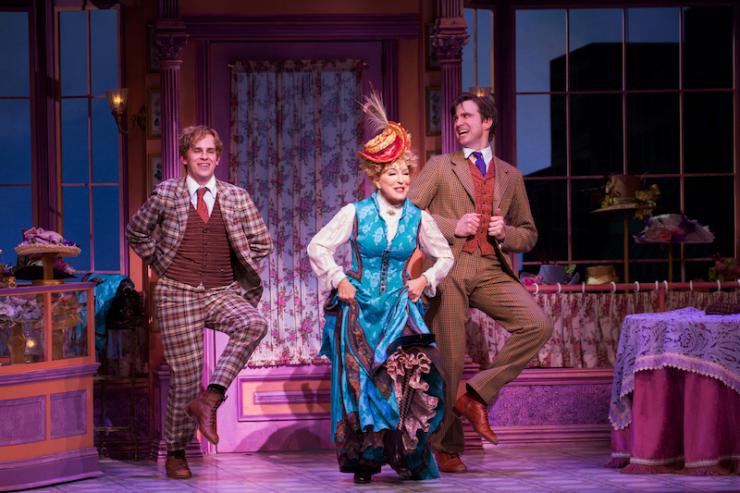
It’s surely uncontroversial to call Hello, Dolly escapist entertainment. Is escapism (which the dictionary defines as “the tendency to seek distraction and relief from unpleasant realities”) what we need now more than ever?
Or do we need social engagement? The best current example on Broadway is Lynn Nottage’s play, Sweat, which tells the story of the collapse of a group of friends, family and co-workers who hang out in a bar in Reading, Pennsylvania. The play won the 2017 Pulitzer Prize for Drama—given, according to the citation, “for a nuanced yet powerful drama that reminds audiences of the stacked deck still facing workers searching for the American dream.”
Is escapism … what we need now more than ever? Or do we need social engagement?
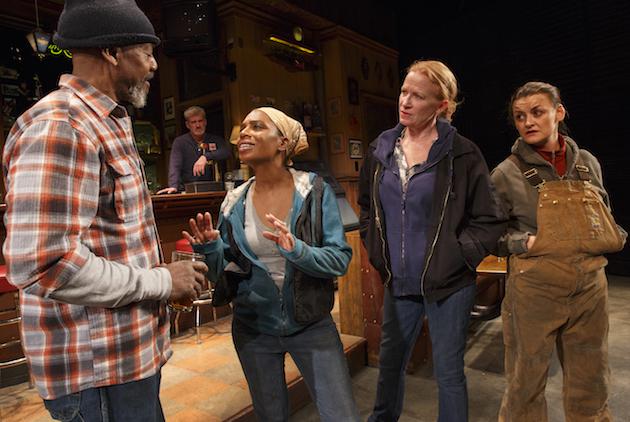
I’m not sure that socially engaged theatre is as easily defined as escapist entertainment. The strongest socially engaged works can be said to confront audiences with societal, political, and/or cultural issues of the day in hopes not just of informing and enlightening, but of moving us to change the world. Yet, what about an otherwise zesty or zany entertainment that just vaguely touches on, or sneaks in, something relevant to what’s going on in the world?
Applying the looser definition, one can argue that there was more socially engaged theatre during the Broadway season just ended than purely escapist entertainment.
Consider these three lists, with links to my reviews, organized chronologically by the date when they opened (omitting one I didn’t get to see, and a couple more that I did, which I’m not sure how to categorize).
Purely Escapist
Paramour
CATS
Holiday Inn
Oh, Hello
Les Liaisons Dangereuses
The Illusionists
In Transit
Sunset Boulevard
The Play That Goes Wrong
Amelie
Present Laughter
War Paint
Groundhog Day
Hello, Dolly
Charlie and the Chocolate Factory
Anastasia
Socially Engaged
An Act of God
Dear Evan Hansen
Jitney
The Price
Sweat
Oslo
Indecent
The Little Foxes
Bandstand
A Doll’s House, Part 2
Shows in this third group might tilt toward escapist, but have socially conscious elements, or at least try to.
Motown
The Front Page
Falsettos
Natasha, Pierre and the Great Comet of 1812
A Bronx Tale
Significant Other
The Glass Menagerie
Come From Away
Miss Saigon
Six Degrees of Separation
It might be worth sorting my list with the ten shows that got the most number of Tony Award nominations earlier this week:
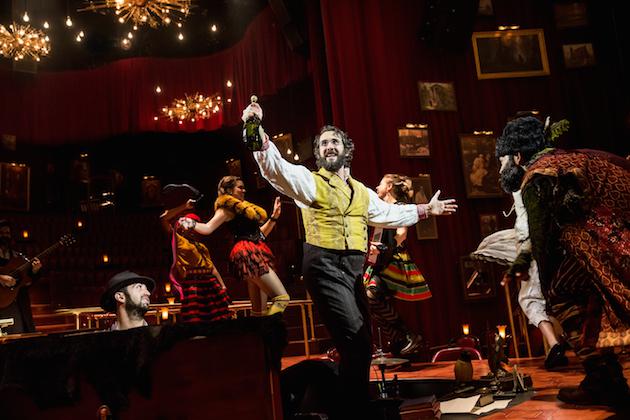
Natasha, Pierre & The Great Comet of 1812: twelve nominations, including Best Musical. I put this in the third category, having socially conscious elements. An adaption of a sliver of Tolstoy’s War and Peace, the musical focuses on Natasha's affair with Anatole, and Pierre's search for meaning in his life, the latter of which may or may not be an example of social engagement. However, the first lines of the first song of this sung-through musical is:
“There’s a war going on
Out there somewhere
And Andrey isn’t here”
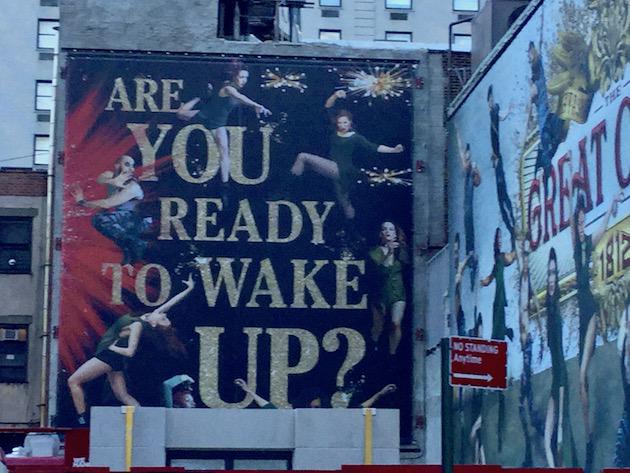
This is a story, then, that’s set against a background of wartime Russia, and arguably shows the effect of war on civilian life. It’s also worth noting that their slogan, up on their marquee and on a wall mural nearby is: “Are You Ready to Wake Up?”
Hello, Dolly!: ten, including Best Revival of a Musical. Purely escapist. The show, with a tuneful score by Jerry Herman, was a star vehicle and something of a throwback from its Broadway debut in 1964. It focuses on a nineteenth century New York widow who works as a matchmaker and anything else that might make her a buck, as she schemes to snag a rich second husband.
Dear Evan Hansen: nine, including Best Musical. Socially conscious. It’s a musical that focuses on outcast kids in high school, and delves into a range of issues, most obviously teen suicide and the problems of social media, but also income inequality.
A Doll’s House, Part 2: eight, including Best Play. Socially conscious. A sequel to Ibsen’s A Doll’s House written by Lucas Hnath making his Broadway debut, which shows Nora returning home after fifteen years, with an ulterior motive. Much of the play is a debate about marriage, and conversation about a woman’s place in society.
Come From Away: seven, including Best Musical. This show, about the people of Gander, Newfoundland, taking care of the passengers of a grounded plane during September 11th, is most often described as a feel-good musical. I put it in the third category. In the comments section of my HowlRound piece about this show, a reader accused me of politicizing an “innocuous,” apolitical show. I answered that I was not sure you can set a show during September 11, 2001 without the show being inherently political, but I don't think they completely avoid politics; it's certainly political, for example, that we're shown the hostility and suspicion towards a Muslim passenger.
Groundhog Day The Musical: seven, including Best Musical. Escapist. Based on the Bill Murray movie, the musical places a TV weatherman in the (comic) hell of having to repeat the exact same day over and over.
Oslo: seven, including Best Play. Socially conscious. It’s about a diplomatic effort to achieve peace in the Middle East.
August Wilson’s Jitney: six, including Best Revival of a Play. Socially conscious. Like Sweat, this last of Wilson’s 10-Play American Century Cycle plays to debut on Broadway focuses on the lives of a group of people in a particular place, in this case a jitney station in Pittsburgh. We see them grappling with racism, poverty, and gentrification.
Lillian Hellman’s The Little Foxes: six, including Best Revival of A Play. Socially conscious.
Falsettos: five, including Best Revival of a Musical. I put this in the third category. I can see somebody objecting to calling Falsettos even a little bit escapist since its second act focuses on a gay man dying of AIDS.
Indeed, one can easily argue with the category to which I have assigned any number of individual shows. Isn’t War Paint inspired by the true story of two women succeeding in the man’s world of business, so why then is it categorized as purely escapist? (It’s two-plus hours of divas singing gorgeously about makeup.) How is the jokefest that is An Act of God socially conscious? (It takes on religion and politics.) Isn’t Miss Saigon exploiting the issue of Amerasian orphans to manipulate the audience into unearned emotion? (I think so, yes, but it still presents the issue.) How can you list X as purely escapist when it was pure junk and didn’t help me escape from anything? (Good point.)
Escapist fare is most irksome not when it focuses on something other than the world’s concerns, but when it demonstrates an active indifference to those concerns.
Whatever the quibbles about what shows belong to which categories, I found it a useful exercise to think of the Broadway season in this way. It helped me better understand my taste in theatre. I ultimately find shows more satisfying that have some clear connection to the larger world. Yet I also now recognize some of the appeal of shows that at their best provide audience and actors a different kind of connection—with each other in the moment. “Escapist” does not have to mean mindless or inattentive. In Hello, Dolly, the thunderous reaction to Bette Midler, who is performing in a Broadway musical for the first time in fifty years, created a gift of energy that felt passed back and forth between the auditorium and the stage.
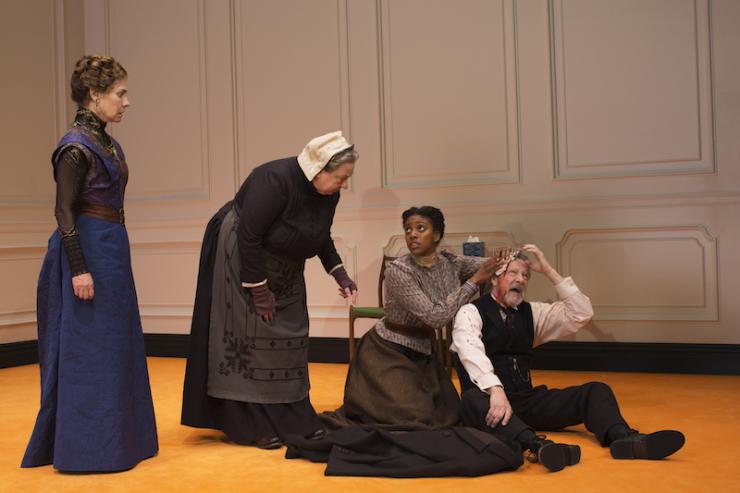
Escapist fare is most irksome not when it focuses on something other than the world’s concerns, but when it demonstrates an active indifference to those concerns. Anastasia is lovely to look at, with a score by Stephen Flaherty and Lynn Ahrens that builds on the songs, beloved by a generation, that they wrote for the 1997 animated film of the same name But, as I pointed out in my review, the story of the legend around the youngest daughter of the last Czar of Russia winds up promoting nostalgia for a ruler who sponsored pogroms against the Jews and violently suppressed popular Russian calls for democracy. “Russia has damned itself to eternity for what it has done,” says the Dowager Empress, the mother of Nicholas II, and it is not clear whether she just means the killing of her son and his family by Bolshevik firing squad, or the overthrow of the monarchy. (It might be worse that Mary Beth Peil is so good in the role; she was nominated for a Tony.) The only person in the musical who could contradict her (but not to her face) is a character named Gleb, a Soviet official whose mission is to track Anastasia down and kill her. Book writer Terrence McNally tries to make this villain sympathetic—he’s well-meaning, sincere, and (thanks to director Darko Tesnjak’s casting of Ramin Karimloo in the role)—very handsome. Still, it gave me pause that Flaherty, Ahrens, and McNally are the same team that created the socially conscious musical Ragtime.
Am I needlessly politicizing a fairytale for children? I believe I am pointing out something that’s already there. There is a difference between providing relief from unpleasant realities and pretending that unpleasant realities are pleasant.
Intentionally or not, Anastasia establishes an affinity with the powerful. By contrast, most of the socially engaged Broadway shows from the season identify with the powerless. In The Little Foxes, Lillian Hellman sides with the powerless members of a Southern family whose dominant members are abusive and avaricious. You need not know of Hellman’s politics to realize this power struggle within a single Southern family at the turn of the twentieth century functions as a metaphor for the evils of capitalist exploitation.
Just as it is inaccurate and unfair to dismiss all Broadway shows as escapist (as some serious theatremakers who don’t go to Broadway sometimes do), so there are no easy assumptions to make about plays versus musicals. Not all musicals are escapist fare; and not all escapist shows are musicals. Not all straight plays are socially engaged. Not all socially engaged shows are straight plays. It’s true that all four of the Best Play Tony nominees this year are socially conscious, but three of the four Best Musical nominees also have socially conscious elements.
And even the most socially conscious shows on Broadway use elements most associated with escapist fare. Sweat reminds me of Grapes of Wrath, a dramatic look at a specific group of people whom we get to know. They stand in for an entire demographic trapped in a bad situation that is not of their making, but they come off as well-developed characters (at least to me) not as a demographic sampling.
I don’t know the answer to the question, which type of show is most needed in these trying times: escapist or socially conscious? I imagine it depends on the individual theatregoer, and the individual show. But I suspect we’ll be seeing more shows on Broadway like Bandstand, which is an original musical about a group of musicians who form a 40s swing band to win a song contest sponsored by Bayer Aspirin, NBC, and MGM. Directed and choreographed by Andy Blankenbuehler, who won Tonys for Hamilton and In The Heights and was just nominated for another, the show has lots of fun, inventive dancing, and an original score that pays homage to the jazz, blues, and swing music of the 1940s. All the band members are veterans of World War II, and all have been damaged by the war in some way, and then damaged again by the indifference back home. I would guess that most of the people in the audience were drawn to the show for the promise of the music and the dancing, and maybe for the stars Corey Cott and Laura Osnes. But there was one scene when the sponsors of the contest pulled a fast one, inserting something in the contract that the band members found exploitative. One of the band members explodes: “We're goddamn United States veterans, and these people wouldn't know real sacrifice if it slapped 'em in the face.” The audience gave the line a raucous ovation; some were tearing. The character was talking about the representatives of an aspirin manufacturer and a network. But we knew who they really meant.
Jonathan Mandell’s New Crit piece usually appears the first Thursday of each month. See his previous pieces here.






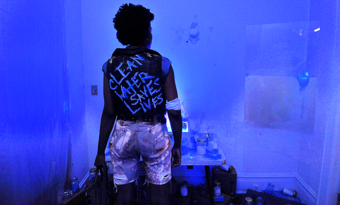

Comments
The article is just the start of the conversation—we want to know what you think about this subject, too! HowlRound is a space for knowledge-sharing, and we welcome spirited, thoughtful, and on-topic dialogue. Find our full comments policy here
Johnathan, yes. Yes, you are absolutely needlessly politicizing a fairy tale. Why bother? You are injecting politics in the most absurd way possible.
And yes, you can make an apolitical work about 911. They did. It was Come From Away. If the fear of Muslims *on* 911 jumps out at you as the most political aspect of the play, fine. But that doesn't make the play a treatise on islamaphobia. The play is 99.99% apolitical. It's shallow.
See also: World Trade Center by Oliver Stone and United 93 by Paul Greengrass. Apolitical works about 911.
You are torturing logic to find things that aren't there. Why? Because politics. Let it go.
And yes, we need both escapism and political work.
How do you define politics and political?
You know it when you see it. Like art. Or pornography.
Plays advocating for social change or describing a social ill are political. Plays about the human condition or aimed at sensory pleasure--or musicals about princesses--are not. You'd have to bring your own politics to find any in Hello, Dolly. Or Come From Away.
The first definition of politics in the Miriam-Webster dictionary offers variations on "the art and science of government."
Another set of definitions offers variations on "competition between competing interest groups or individuals for power..."
One of the other definitions of politics in that dictionary is "the total complex of relations between people living in society."
You seem to condemn analyses of works of theater that consider politics in the full range of its meanings unless the work is explicitly "political" in the narrowest sense. We disagree about this, and will likely disagree in the future. I'll try to ignore your ad hominem innuendo, which is at least much milder this time around. (In your comments in my previous article, I was apparently a bitter, self-involved political animal. Now I seem merely to be "injecting" politics, as if it's my drug of choice.)
I do NOT say that Hello, Dolly is political, which you seem to be implying now; I say the exact opposite in this piece. It's pure escapism, as I say "Anastasia" is. (I do think it would be interesting to look at the total complex of relations between the sexes in Hello, Dolly, but I have not done so.) I have not said that "Come from Away" is a treatise on anything. I can't disagree that it's shallow, although that's harsher than I've put it.
Whoa, I do not want apolitical theatre and was going to respond earlier by referring to the dictionary. But I'm trying to sound it out and I don't think either of us are relying on the dictionary definition. We have agendas.
You reviewed the show as an affront to New Yorkers. You specifically said, "Hey, is this play saying New Yorkers are insensitive?"
No.
More to come.
I'll try to clarify what I was saying since you apparently misunderstood
1. I think it legitimate to apply a political analysis to a work of theater whether or not the play is overtly or intentionally advocating for or depicting a specific cause or party or worldview. But I'm talking about an analysis that uses "politics" in its broadest range of meanings
2. I won't rehash the debate over Come From Away except to say you misrepresent my view, and put in quotation marks something I never said.
3. No more to come
I'm sorry, I was paraphrasing, and since you think I can't understand you, I'm not going to bother reading the piece again. But you absolutely said (paraphrasing), "Is this play suggesting that New Yorkers were not supporting each other on 911?" Which is the nonsensical result of deconstructing everything through some meta-political lense. It's ridiculous. It's navel-gazing postmodern critical theory. People are tired of it. You can't let a fairy tale be a fairy tale.
Goodbye forever!
People are tired of trying to respond to somebody who violates the basic norms of civil intellectual discourse and of English grammar. Is it nobler to respond to the slings and arrows of the outrageously misplaced hostility by calmly correcting the misrepresentations once again, or by ignoring them?
What? I violated what? I used quotation marks and didn't say I was paraphrasing? Did I say I was quoting you? This is a comments section. I was wrong, you're right. I admitted my mistake. Sometimes communication is tough. In comment sections.
Outrageously misplaced hostility? Hyperbole, much? I think you're a critic who cannot view anything outside your postmodern deconstructionist goggles. You said so yourself (not literally). And people are absolutely tired of idealogues. You think people are tired of me misusing quotation marks? They are tired of being told everything is political, even when it's clearly not. You are an idealogue. Please reconsider your worldview.
And don't quote Shakespeare. Jesus. Just...don't.
Violations of grammar: Paraphrasing, by definition, omits the use of quotation marks. The correct spellings are "lens" and "ideologue."
Violations of civil discourse: "ridiculous," nonsensical," "navel-gazing" "idealogue" -- and that's just in the last two comments.
For the record: I don't wear "postmodern deconstructionist goggles." I do think it legitimate to examine a work of theater from many different angles. I accept that you disagree, which is a valid point of view. I am sorry you feel the need to lace your views with insults.
This is a tiresome exchange that has little discernible connection to the subject of the essay, which was (remember this?) a look at escapist versus socially conscious theater in the Broadway season just ended.
Dude I'm on a phone. My many apologies for Grammer and spelling. Do you not text?
I have accepted my mistakes. You politicized Anastasia. And Come From Away. Which is the greater assault on discourse? You are not prepared at all to even contemplate that you've gone too far?
Tedious indeed. See ya.
Not for publication.
Yours.
No.
, I asked Robert Schenkkan, the playwright of the anti-Trump play "Building the Wall" this question that's come up in the comments section of whether socially conscious theater can make a difference. Here is the video of the interview
(A direct link to Youtube doesn't work, so here is the video embedded in a post -- https://newyorktheater.me/2...
There is no question whether deeply engaged, community-rooted and democratic social consciousness in any discipline can make a difference. The question, for me, is whether the business model you describe (and is still in the 21st century, as you've pointed out, still the determiner of most of America's theatrical exposure, as couture is the determiner of mass-produced fashion) adequately serves the broader society of which it claims to be conscious. Clearly it is conscious on some level (the consequences of isolationism and disconnect are almost impossible to ignore) and its workers feel a responsibility to "society". I'm not sure that consciousness translates to sufficient engagement of, or measurable benefit to, the underserved populations it's conscious of. You seem to think the physical presence of theater patrons on the "barricades" – by which I take it you mean the places many of us actually live and work and make art – is too high a bar to set. I suggest that if these socially conscious productions do not direct their consumers and makers towards those front lines, they aren't committed enough in 2017.
I can't argue with you, or at least don't want to, about the level of commitment required in 2017.
By manning the barricades, I meant full out, committed, in your face activism
Well you've already taken a lot of time to discuss this in depth, and I appreciate it – and your writing. Thank you!
While I've despised the animated movie "Anastasia" ever since it came out, ragging on it as a sole example to prove a major leg of this article's thesis stool seems woefully insufficient -- particularly in an article of such length and which incorporates so much back-filling and redundancies (in an apparent effort both mediate the central thesis of the article for those who don't agree with it, while also reaching the apparently preordained word count.
Yikes! Okay, that opening paragraph turned out more harsh than I intended, but I guess this article really touched a nerve. First, I'm so sick of half-arsed plays that have some generic scene or scenes involving racism (or whatever) that we've seen a thousand times before (TV shows, movies, previous plays, et cetera) suddently being elevated in status (by reviewers and other pundits) because they are "socially engaged" or "socially conscious" or whatever.
Second -- actually first in terms of what pissed me off and motivated me to write this comment (hey, at least give me credit for honesty!) -- was the designation of "Groundhog Day" as being "purely escapist". Now granted I haven't seen the musical, but the movie is one of my all-time favorites, and since the book of the musical is written by the guy (Danny Rubin) who wrote the original screenplay (which was then improved by Harold Ramis) I find it hard to believe it strays too far from the movie. And the movie has been lauded (perhaps Mandell isn't aware of this) by religions throughout the world for it's spiritual insights into the human condition.
Further (as a huge fan of musicals in general), I think most of the good ones have tremendous insights into the human condition (as do the best plays and movies), regardless of whether they have any obvious scenes (such as hostility toward Muslims) of what NOT understanding the complexities of the human condition and human behavior can lead to.
BOTTOM LINE: I think many so-called escapist plays and musicals (and movies) actually do a better job of inspiring spiritual growth in the audience than do the more obvious plays with their overly familiar scenes depicting the results of not understanding the human condition.
(Even if the so-called escapist works are comedies, for often the best way to get someone to understand something -- even a demon within himself or herself -- is with comedy.)
(As [ironically] stated by a character in an episode of "The Simpsons": "comedy is nothing more than an insightful observation, humorously phrased, and delivered with impeccable timing.")
The aesthetic value of these shows aside, I'm wondering how we can have a useful conversation about socially engaged theater without discussing the composition of the audience. Who's in the house? What social groups are the plays engaging? Who can afford to be there – no, not as part of a special promotion; surely we don't accept tokenism as a substitute for inclusive, consistent community engagement – and how reflective of entire neighborhoods, entire boroughs, entire ethnic and racial populations, are these audiences? I wonder how broad a segment of society would claim to be engaged by socially engaged theater; and could we prove or disprove it by statistical attendance? Or (most uncomfortable thought of all) could we measure it by the incidence of ACTUAL social engagement facilitated or provoked by attending these shows? Is an audience member more likely to wipe the tears from her face following that standing ovation and contact an actual veteran; and, if so, how has the veteran been instrumental in devising the cultural investigation of his own problem? Does the veteran population benefit materially, financially, as a result of socially engaged plays about veterans? What is the theory of change here? Who benefits?
These are great questions. Let me address the second half of your questions first, the ones about the tangible effect of such "engagement." It's a question I asked in a HowlRound piece I wrote in 2014, phrasing it like this: What theater has ever directly made a difference?
Here are some of the answers I came up with in that piece:
Waiting For Lefty, the Depression-era play about a taxi driver strike, by Group Theatre playwright Clifford Odets, was performed all over the country in support of labor unions.
Fortune and Men’s Eyes (1967) by John Herbert led to the creation of The Fortune Society, which helps ex-convicts find jobs—a success story written up in a recent memoir by its producer, David Rothenberg, entitled Fortune In My Eyes.
The Exonerated by Erik Jensen and Jessica Blank, based on transcripts of wrongfully convicted prisoners on Death Row, is said to have influenced Illinois Governor Ryan’s blanket commutations of the state’s death penalties.
The Vagina Monologues by Eve Ensler inspired a global movement known as V-Day that fights to end violence against women.
The Laramie Project by the Tectonic Theater is said to have helped lead to the signing of the Matthew Shepherd Hate Crimes bill; the theater company was invited to the signing of the legislation at the White House.
The Normal Heart, when produced in 1985, led mainstream newspapers such as The Christian Science Monitor to mention HIV/AIDS for the first time anywhere in their pages.
The Justice Cycle, six plays including Los Illegals by Michael John Garces, the artistic director of Cornerstone Theater Company, led to a theater troupe of day laborers, Teatro Jornalero Sin Fronteras (Day Laborer Theater Without Borders), that educates day laborers about their rights.
8 the Play, based on transcripts of the trial that overturned the ban on same-sex marriage in California, helped move the conversation forward, arguably helping to change the American public’s attitude.
Two of these shows were on Broadway -- Waiting for Lefty, and The Normal Heart, although the latter only in a revival a quarter century later.
The Broadway audience that supported labor unions because of Waiting for Lefty is surely changed. So to your first set of questions. Here are statistics about the Broadway audience compiled by the Broadway League, the trade organization of theater owners and producers, for the 2015-2016 season. Looking at the 13.3 million "admissions" that season
63% of those were made by tourists:
Sixty-seven percent of the ticket-buyers were female.
The average age of the Broadway theatregoer was almost 44 years.
Seventy-seven percent of all tickets were purchased by Caucasian theatregoers.
80% had completed college and 40% had earned a graduate degree.
So how does that compare with statistics about Americans as a whole?
50.8 percent of Americans are female
The national median age in the United States was 37.8 years in 2015.
Seventy-seven percent of Americans were 'white alone" (meaning not mixed race, but including Hispanics) in 2015, according to the U.S. Census Bureau
Nearly 40 percent of working-aged Americans now hold a college degree,
Now,I'm sure the demographics vary more widely between Broadway audiences and New Yorkers as a whole (as opposed to Americans as a whole.) And I'd bet that the income discrepancy is marked.
That's what we're dealing with specifically on Broadway (as opposed to all theater.) But I"m not willing to do a reverse Marie Antoinette with a "Let them eat their cake" -- i.e. they don't count.
Yes, Broadway has priced out many people; yes, many Broadway theatergoers won't go home after a socially engaging show and man the barricades. I still think it heartening to see so much socially engaged theater on the Great White Way. And if the direct effect is not immediately evident or precisely measurable, that doesn't mean it's non-existent.
I do agree that intelligent and empathetic treatments of social issues - people's issues - is aspirational and a great part of our legacy as American theater workers. I'm certainly not arguing that we should end this line of production or that Broadway theater doesn't have a right to exist or to address the themes that may help its fairly narrow pool of viewers feel heartened, or that that that may not have an echoing positive effect in other spheres. In too many cases, though, I think the former effect - helping audiences feel more informed and flattering their self-regard - is the primary function of Broadway's socially engaged theater and often academic theater, which are not the same as community-based arts. They don't work the same or serve the same audiences. Everyone is free to support one or both of these institutions. But when we talk about communities and the working people who comprise them, for whom theater no longer serves the functional purpose it did when Waiting for Lefty was staged, I think it's necessary to keep class intersectional with race, gender, and other constructs we know are factors in parity and oppression. It matters who's in the house as much as it matters who wrote the play, who's directing and designing, who's onstage, and who benefits financially from the proceeds of the art. To ask again a question Margaret Atwood put to our current corrupt administration, who are smashing our already unbearable class fractures past the point of sanity: cui bono? Who profits? If the answer is predominately white, wealthy, educated urban production teams/companies and the predominately white, wealthy, educated urban audiences they serve, fine. But let's be honest about this and adjust our definition of what "society" this theater engages. I think that's more than fair - it's our responsibility.
Also, full disclosure: I truly enjoy many of these shows and don't scruple to support Broadway when I'm in town. I'm not a conscientious objector, and that includes the frothiest escapism - I cherish escapism, tbh. I advocate for more escapism AND confrontation for more people, never fewer.
I do agree that intelligent and empathetic treatments of social issues - people's issues - is aspirational and a great part of our legacy as American theater workers. I'm certainly not arguing that we should end this line of production or that Broadway theater doesn't have a right to exist or to address the themes that may help its fairly narrow pool of viewers feel heartened, or that that that may not have an echoing positive effect in other spheres. In too many cases, though, I think the former effect - helping audiences feel more informed and flattering their self-regard - is the primary function of Broadway's socially engaged theater and often academic theater, which are not the same as community-based arts. They don't work the same or serve the same audiences. Everyone is free to support one or both of these institutions. But when we talk about communities and the working people who comprise them, for whom theater no longer serves the functional purpose it did when Waiting for Lefty was staged, I think it's necessary to keep class intersectional with race, gender, and other constructs we know are factors in parity and oppression. It matters who's in the house as much as it matters who wrote the play, who's directing and designing, who's onstage, and who benefits financially from the proceeds of the art. To ask again a question Margaret Atwood put to our current corrupt administration, who are smashing our already unbearable class fractures past the point of sanity: cui bono? Who profits? If the answer is predominantly white, wealthy, educated urban production teams/companies and the predominantly white, wealthy, educated urban audiences they serve, fine. But let's be honest about this and adjust our definition of what "society" this theater engages. I think that's more than fair - it's our responsibility.
Urggh...disqus keeps insisting my reply is spam. I'll repost and let you be the judge.
I do agree that intelligent and empathetic treatments of social issues - people's issues - is aspirational and a great part of our legacy as American theater workers. I'm certainly not arguing that we should end this line of production or that Broadway theater doesn't have a right to exist or to address the themes that may help its fairly narrow pool of viewers feel heartened, or that that that may not have an echoing positive effect in other spheres. In too many cases, though, I think the former effect - helping audiences feel more informed and flattering their self-regard - is the primary function of Broadway's socially engaged theater and often academic theater, which are not the same as community-based arts. They don't work the same or serve the same audiences. Everyone is free to support one or both of these institutions. But when we talk about communities and the working people who comprise them, for whom theater no longer serves the functional purpose it did when Waiting for Lefty was staged, I think it's necessary to keep class intersectional with race, gender, and other constructs we know are factors in parity and oppression. It matters who's in the house as much as it matters who wrote the play, who's directing and designing, who's onstage, and who benefits financially from the proceeds of the art. To ask again a question Margaret Atwood put to our current corrupt administration, who are smashing our already unbearable class fractures past the point of sanity: cui bono? Who profits? If the answer is predominantly white, wealthy, educated urban production teams/companies and the predominantly white, wealthy, educated urban audiences they serve, fine. But let's be honest about this and adjust our definition of what "society" this theater engages. I think that's more than fair - it's our responsibility.
I'm not sure about that "fairly narrow pool of viewers." The influence of Broadway is huge. Many a show that's made it to Broadway spreads out across the nation, not just in national tours and regional productions, but eventually in community theaters and high school auditoriums.